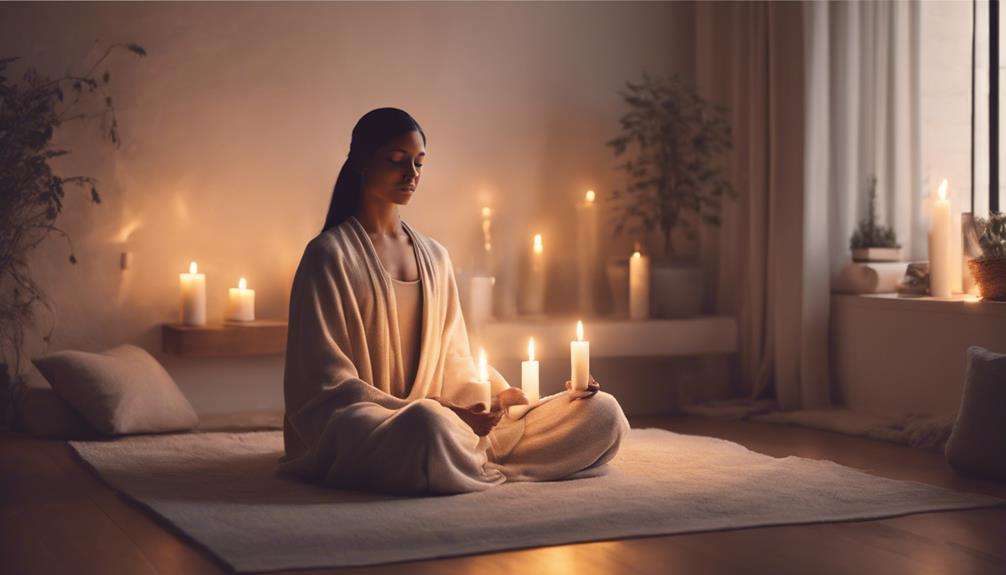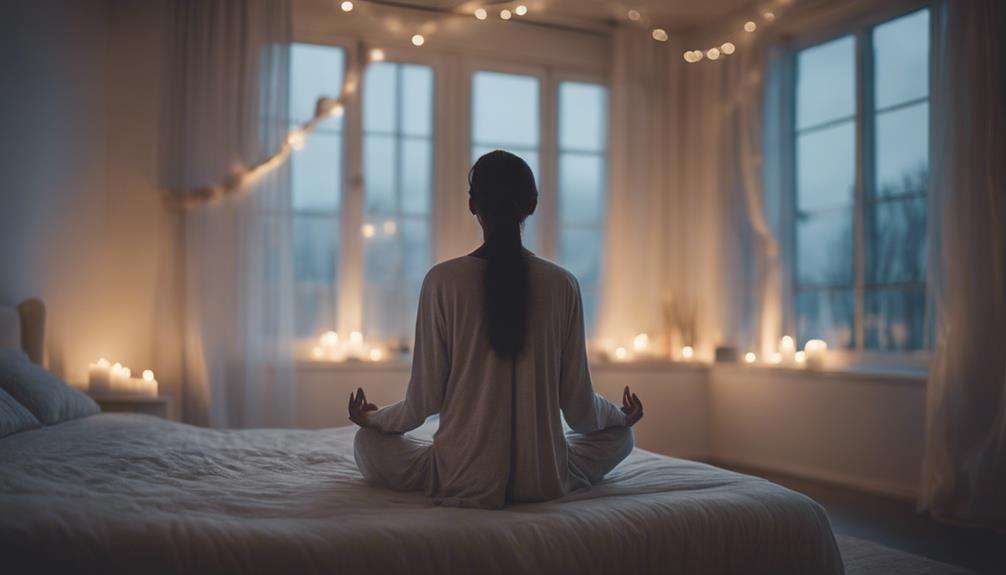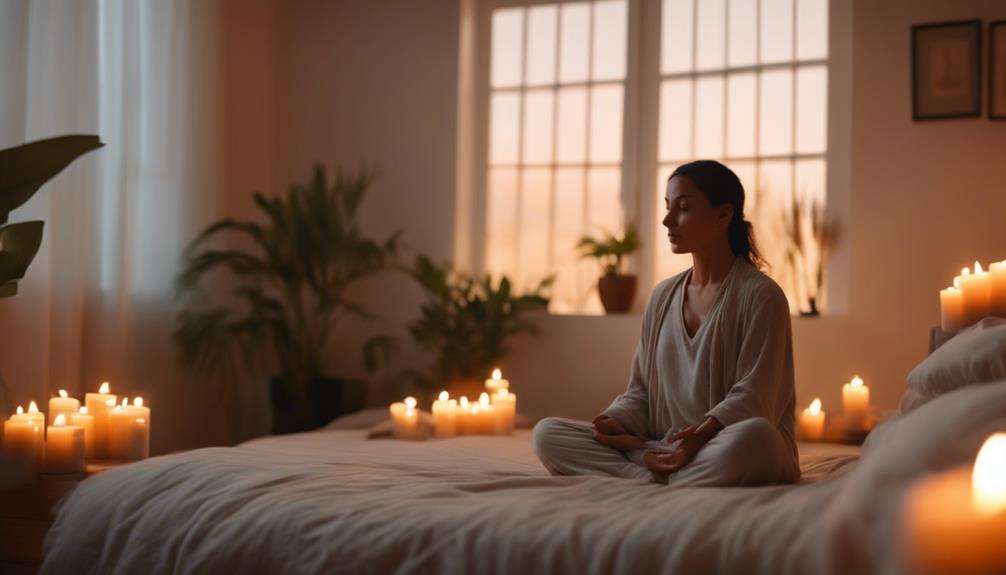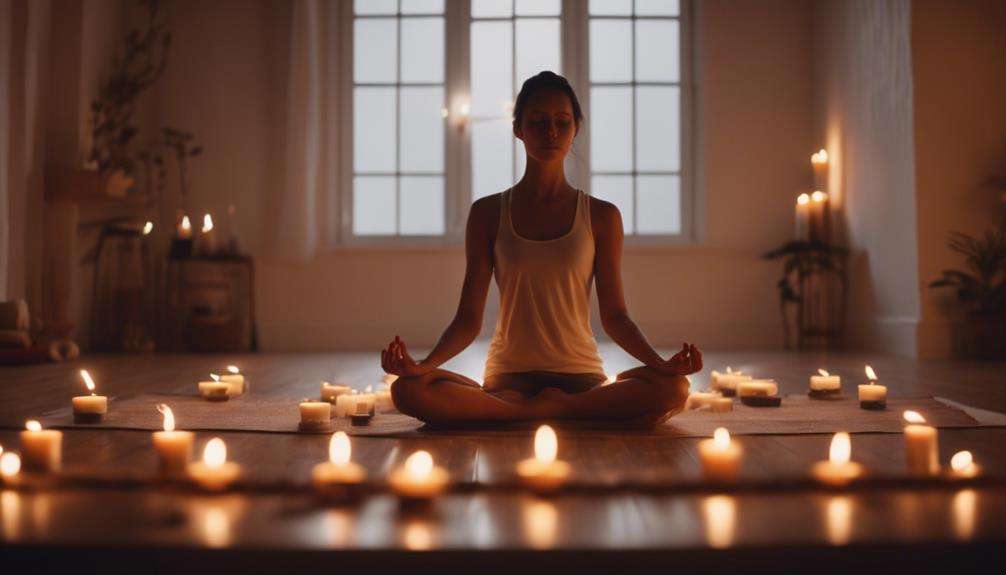If you've ever struggled with sleep, you might find relief in incorporating specific mindful movements into your daily routine.
These movements not only relax your body but also calm your mind, setting the stage for a more restful night.
By exploring the connection between movement and sleep quality, you can discover a natural way to enhance your bedtime routine and improve your overall well-being.
Key Takeaways
- Engaging in mindful movements before bedtime promotes relaxation and eases muscle tightness.
- Regular practice of yoga poses like Pigeon Pose and Bridge Pose supports a healthy sleep routine.
- Deep breathing exercises and mindful breathing techniques cultivate a peaceful sleep environment.
- Listening to calming soundscapes enhances sleep quality and promotes mental tranquility.
Mindful Movements for Sleep Quality
Engaging in mindful movements before bedtime can significantly enhance sleep quality by relieving tension in key areas such as the upper back, hips, and neck. Mindful movements like Cat/Cow, Deep Lunge, and Seated Neck Stretch specifically target these areas, promoting relaxation and easing muscle tightness. By incorporating these movements into your bedtime routine, you can help release physical tension, calm your mind, and create a peaceful mental environment conducive to restful sleep.
Dynamic Bridge and Knee to Chest into Twist movements can also be beneficial in opening chest muscles and relaxing the low back and hip areas, further aiding in promoting better sleep. These movements not only alleviate muscle tightness but also contribute to body balance, which is essential for achieving a state of relaxation before sleep. By practicing these mindful movements regularly, you can improve your overall sleep quality naturally and enjoy a more restful night's rest.
Yoga Poses for Better Sleep
To further enhance your sleep quality through mindful movements, exploring specific yoga poses tailored for better sleep can be highly beneficial. Yoga poses like Legs Up the Wall and Child's Pose are known for promoting relaxation and improving sleep quality naturally.
Practices such as Corpse Pose and Cat/Cow can help release tension in the body and calm the mind before bedtime. Poses like Forward Fold and Happy Baby pose aid in stretching and relaxing muscles, which can reduce stress and promote better sleep.
Incorporating yoga poses like Supine Spinal Twist and Savasana enhances circulation, releases muscle tension, and prepares the body for restful sleep. Regular practice of yoga, especially poses like Pigeon Pose and Bridge Pose, contributes to a peaceful mind-body connection, supporting a healthy sleep routine.
Meditation Techniques for Improved Sleep

Engaging in breathwork techniques like the 4-7-8 breathing method can help calm your mind and promote a sense of relaxation conducive to better sleep.
Additionally, body scan meditations are effective in releasing tension from different areas of your body, aiding in relaxation before bedtime.
Exploring these meditation practices may offer you a pathway to improved sleep quality and overall well-being.
Breathwork for Calm Sleep
By incorporating breathwork techniques like diaphragmatic breathing and the 4-7-8 breathing method into your bedtime routine, you can effectively promote calm and improve the quality of your sleep through enhanced relaxation responses.
Diaphragmatic breathing engages the diaphragm, reducing the body's stress response and activating relaxation. The 4-7-8 breathing technique focuses on inhaling for 4 seconds, holding for 7 seconds, and exhaling for 8 seconds, aiding in breath control and deep relaxation.
These practices before bed help calm the mind, lower stress levels, slow heart rate, and create an ideal state for restful sleep. Mindful breathing techniques like diaphragmatic breathing and 4-7-8 breathing serve as valuable tools to cultivate a peaceful and conducive sleep environment.
Body Scan Relaxation
Body scan relaxation is a meditation technique for improved sleep. It involves systematically focusing on different body parts to release tension before bedtime. This mindfulness practice helps heighten awareness of bodily sensations, fostering a deep sense of calm conducive to better sleep quality. By attentively moving attention through each body area, one can pinpoint and alleviate physical stress, establishing a tranquil mental state.
Studies suggest that engaging in body scan meditation reduces stress, anxiety, and physical discomfort, fostering conditions that support easier sleep initiation and sustained rest. Regular incorporation of body scan relaxation into bedtime routines enhances body-mind connection, induces relaxation, and contributes to a more rejuvenating and uninterrupted sleep cycle. Embracing this practice may offer a natural pathway to improved sleep quality.
Breathing Exercises for Sleep Quality
When it comes to improving your sleep quality, focusing on your breath can make a significant difference. Deep breathing exercises activate your body's relaxation response, preparing you for a restful night.
Deep Breathing Benefits
Engaging in deep breathing exercises before bedtime can significantly enhance your sleep quality by triggering the body's relaxation response. Deep breathing, especially diaphragmatic breathing, strengthens the diaphragm, making breathing more efficient and aiding in relaxation for better sleep.
The 4-7-8 breathing technique, involving specific inhale, hold, and exhale counts, helps regulate breath and promote calmness before sleep. By practicing diaphragmatic or 4-7-8 breathing for a few minutes each night, you can prepare your body and mind for restful sleep.
Starting with short sessions and gradually increasing the practice time can lead to improved sleep quality over time. These techniques offer a simple yet powerful way to relax and improve your sleep naturally.
Relaxation Through Breath
Utilizing specific breathing techniques before bedtime can be instrumental in promoting relaxation and enhancing the quality of your sleep naturally. When practicing deep breathing for better sleep, consider these key points:
- Exhale Longer: Exhaling twice as long as inhaling can calm your mind and nervous system.
- Focus on Rhythm: Pay attention to your natural breath rhythm and subtle belly movements to aid in relaxation.
- 2:4 Breathing Ratio**: Inhale slowly for 2 counts, pause for 1, and exhale slowly for 4 counts to promote relaxation and concentration.
- Transition to Natural Breathing**: After practicing the breathing ratio, shift to natural breathing to integrate calming effects into your everyday breath pattern.
These mindful breathing techniques can induce relaxation, preparing your body and mind for a restful night's sleep.
Sleep-Inducing Breathing Techniques
To enhance the quality of your sleep naturally, incorporating sleep-inducing breathing techniques can be highly beneficial.
Breathing exercises like diaphragmatic breathing, where you focus on deep breaths that engage the diaphragm, can help activate the body's relaxation response, promoting better sleep quality. Specifically, techniques such as 4-7-8 breathing, which involves inhaling for 4 seconds, holding for 7 seconds, and exhaling for 8 seconds, can aid in controlling breath speed and facilitating sleep onset.
Progressive Muscle Relaxation for Sleep
Progressive Muscle Relaxation (PMR) assists individuals in reducing physical tension and promoting relaxation before sleep by systematically tensing and releasing different muscle groups from head to toe. This technique has been shown to be effective in enhancing relaxation and improving sleep quality. Through PMR, you can become more aware of your muscle tension patterns, allowing you to release tension and unwind, setting the stage for a restful night's sleep.
- PMR involves a step-by-step process of tensing and relaxing muscle groups to alleviate physical tension.
- Research supports the use of PMR as a natural way to promote relaxation and improve sleep quality.
- Regular practice of PMR can help you develop a deeper understanding of your body's tension levels and enhance your ability to relax.
- PMR is a widely utilized technique to prepare the body for sleep and achieve a state of calm before bedtime.
Visualization Practices for Better Sleep

Visualization practices for better sleep harness the power of mental imagery to induce relaxation and reduce stress, providing a natural pathway to improved sleep quality. By utilizing techniques like body scan visualizations, individuals can sequentially focus on relaxing different body parts, releasing tension, and fostering a sense of calm.
Incorporating Autogenic Training into visualization routines enhances the relaxation process by combining body scan methods with affirmations related to feelings of heaviness and warmth. This dual approach helps in calming both the mind and body, paving the way for a more restful night's sleep.
The repetition of phrases associated with heaviness and warmth for each body part during visualization exercises further promotes a state of relaxation, making it easier to drift off into a peaceful slumber. These visualization practices offer an effective means of reducing stress and promoting relaxation, ultimately contributing to an overall improvement in sleep quality naturally.
Soundscapes for Deep Sleep
Listening to calming soundscapes, such as nature sounds, gentle music, or white noise, can significantly enhance your sleep quality. These auditory stimuli can help mask disruptive noises, create a tranquil sleep environment, and promote relaxation before bedtime.
Research indicates that incorporating soundscapes into your nightly routine may reduce stress, elevate mood, and improve both the onset and duration of your sleep.
Calming Nature Sounds
How do calming nature sounds, also known as soundscapes, contribute to promoting deep and restful sleep? Nature sounds play a crucial role in enhancing relaxation and improving sleep quality. Here's why soundscapes are beneficial for your sleep routine:
- Inducing Relaxation: Nature sounds like gentle rain or ocean waves create a soothing environment that relaxes the mind and body.
- Masking Background Noise: Soundscapes can drown out disruptive sounds, helping you to fall asleep faster and stay asleep longer.
- Reducing Stress: Listening to nature sounds before bedtime can decrease stress levels, promoting a sense of calmness conducive to sleep.
- Improving Sleep Quality: Studies suggest that exposure to nature sounds can enhance sleep duration and reduce disturbances, leading to a more restful night.
Relaxing Bedtime Melodies
Nature sounds have a profound impact on promoting deep and restful sleep, and now let's explore how Relaxing Bedtime Melodies can further enhance this calming environment.
Bedtime soundscapes, combining relaxing melodies and nature sounds, work wonders for sleep. These soothing tunes help lower stress levels, reduce anxiety, and promote relaxation, setting the stage for a peaceful night's rest.
By listening to these calming melodies before bed, you can improve sleep quality, fall asleep faster, and establish a tranquil atmosphere for rest. The gentle sounds in these soundscapes quiet the mind, slow down the heart rate, and signal the brain that it's time to sleep.
Incorporating these soundscapes into your bedtime routine can support a healthy sleep-wake cycle and enhance overall relaxation for a good night's sleep.
Tranquil Ambient Environments
Tranquil ambient environments, specifically designed soundscapes featuring calming nature sounds like ocean waves or gentle rain, play a crucial role in enhancing relaxation before sleep. Listening to these soothing soundscapes creates a peaceful atmosphere conducive to deep sleep by reducing stress and promoting mental tranquility. Soundscapes for deep sleep have been shown to lower cortisol levels, decrease heart rate, and improve overall sleep quality. Incorporating soundscapes into bedtime routines can signal the brain to wind down, aiding in the transition to a restful sleep state.
- Enhanced relaxation through calming nature sounds
- Reduction in stress levels and promotion of mental tranquility
- Lowering of cortisol levels and heart rate
- Improvement in overall sleep quality through the use of soundscapes.
Body Scan Meditation for Restful Sleep
Body scan meditation is a mindfulness technique that involves systematically focusing on different body parts to release tension and promote relaxation before sleep. By directing attention to sensations in various body regions, this practice enhances body awareness and aids in calming the mind for restful sleep. It allows individuals to identify areas of physical tension or discomfort, consciously releasing and relaxing those areas. This mindfulness technique encourages a deep connection between the mind and body, facilitating a state of relaxation conducive to falling asleep.
Regular practice of body scan meditation before bedtime can improve sleep quality by promoting physical and mental relaxation, leading to a more restful and rejuvenating night's sleep. This method is effective in reducing stress and anxiety, creating a peaceful mindset essential for a good night's rest. Incorporating body scan meditation into your nightly routine can help you unwind, let go of the day's worries, and prepare both your body and mind for a deep and restorative sleep.
Loving-Kindness Meditation for Sleep

After engaging in body scan meditation for restful sleep, transitioning to Loving-Kindness Meditation can further enhance your emotional well-being and promote a positive mindset conducive to peaceful sleep. Loving-Kindness Meditation focuses on cultivating feelings of compassion and kindness towards oneself and others. This practice promotes emotional well-being, reducing stress and anxiety that often disrupt sleep patterns.
By practicing Loving-Kindness Meditation before bed, you can create a positive mental state that aids in falling asleep peacefully. Research suggests that this form of mindfulness meditation can enhance overall sleep quality by fostering a sense of connection and positivity. Incorporating Loving-Kindness Meditation into your bedtime routine may contribute to a more restful and rejuvenating night's sleep.
Key Benefits of Loving-Kindness Meditation for Sleep:
- Cultivates compassion and kindness towards oneself and others
- Promotes emotional well-being and reduces stress
- Creates a positive mental state conducive to falling asleep peacefully
- Enhances overall sleep quality by fostering positivity and connection
Yoga Nidra for Enhanced Sleep
Inducing a sleep-like state while maintaining awareness, Yoga Nidra is a guided meditation practice known for promoting deep relaxation of the body and mind to enhance restful sleep and reduce insomnia symptoms. By engaging in systematic body scanning and visualization techniques, Yoga Nidra helps alleviate stress, anxiety, and tension, creating an optimal mental environment for quality sleep. Research indicates that regular practice of Yoga Nidra can significantly improve overall sleep quality, making it a natural remedy for sleep issues like insomnia.
Yoga Nidra's emphasis on relaxation and mindfulness can have a profound impact on sleep patterns. By guiding practitioners through deep relaxation exercises, this practice allows the body to enter a state of rest that mimics sleep, aiding in the reduction of insomnia symptoms. The combination of physical relaxation and heightened awareness promoted by Yoga Nidra can help individuals achieve a sense of calm and tranquility, setting the stage for a more restorative and rejuvenating sleep experience. Incorporating Yoga Nidra into your bedtime routine may prove beneficial in enhancing sleep quality naturally.
Frequently Asked Questions
How Can Mindfulness Improve Sleep?
Mindfulness improves sleep by enhancing relaxation through breath awareness, body scan, and progressive relaxation techniques. It aids in reducing stress, shifting thoughts away from worry, and creating a positive mental space for restful sleep.
Which Meditation Can Replace Sleep?
For those seeking a meditative alternative to sleep, Yoga Nidra stands out. While not a literal replacement for sleep, its deep relaxation and restful benefits can offer a sleep-like experience, potentially enhancing overall well-being.
What Meditation Is Good for Sleep?
For better sleep, deep breathing promotes relaxation, progressive relaxation reduces tension, and body scan enhances body awareness. Incorporate these practices into your routine to improve sleep quality naturally and enjoy restful nights.
Can Meditation Increase REM Sleep?
You know how a gentle river flows, easing your mind into tranquility? Mindfulness techniques in meditation benefit sleep quality by promoting deep rest, potentially enhancing REM sleep. Engaging in mindful practices can lead to improved sleep patterns.
Conclusion
In conclusion, incorporating mindful movements like Cat/Cow and Deep Lunge into your bedtime routine can work wonders for improving sleep quality naturally.
These movements help release tension, promote relaxation, and create a calm mental space for restful sleep.
By engaging in these practices, you'll experience a sleep so deep and rejuvenating, it'll feel like floating on a cloud of tranquility.
So why wait? Start incorporating these mindful movements today for a truly blissful night's sleep.






